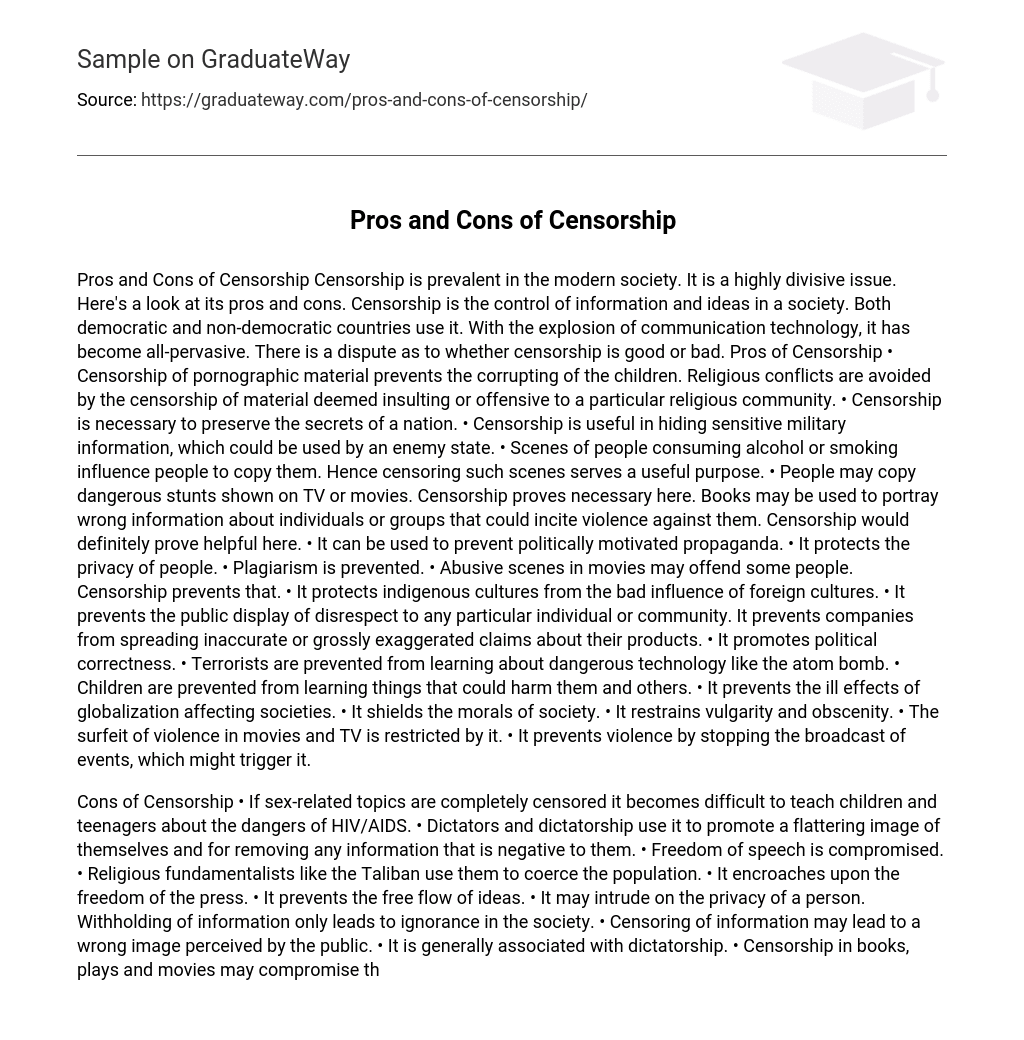Pros and Cons of Censorship Censorship is prevalent in the modern society. It is a highly divisive issue. Here’s a look at its pros and cons. Censorship is the control of information and ideas in a society. Both democratic and non-democratic countries use it. With the explosion of communication technology, it has become all-pervasive. There is a dispute as to whether censorship is good or bad. Pros of Censorship • Censorship of pornographic material prevents the corrupting of the children. Religious conflicts are avoided by the censorship of material deemed insulting or offensive to a particular religious community. • Censorship is necessary to preserve the secrets of a nation. • Censorship is useful in hiding sensitive military information, which could be used by an enemy state. • Scenes of people consuming alcohol or smoking influence people to copy them. Hence censoring such scenes serves a useful purpose. • People may copy dangerous stunts shown on TV or movies. Censorship proves necessary here. Books may be used to portray wrong information about individuals or groups that could incite violence against them. Censorship would definitely prove helpful here. • It can be used to prevent politically motivated propaganda. • It protects the privacy of people. • Plagiarism is prevented. • Abusive scenes in movies may offend some people. Censorship prevents that. • It protects indigenous cultures from the bad influence of foreign cultures. • It prevents the public display of disrespect to any particular individual or community. It prevents companies from spreading inaccurate or grossly exaggerated claims about their products. • It promotes political correctness. • Terrorists are prevented from learning about dangerous technology like the atom bomb. • Children are prevented from learning things that could harm them and others. • It prevents the ill effects of globalization affecting societies. • It shields the morals of society. • It restrains vulgarity and obscenity. • The surfeit of violence in movies and TV is restricted by it. • It prevents violence by stopping the broadcast of events, which might trigger it.
Cons of Censorship • If sex-related topics are completely censored it becomes difficult to teach children and teenagers about the dangers of HIV/AIDS. • Dictators and dictatorship use it to promote a flattering image of themselves and for removing any information that is negative to them. • Freedom of speech is compromised. • Religious fundamentalists like the Taliban use them to coerce the population. • It encroaches upon the freedom of the press. • It prevents the free flow of ideas. • It may intrude on the privacy of a person. Withholding of information only leads to ignorance in the society. • Censoring of information may lead to a wrong image perceived by the public. • It is generally associated with dictatorship. • Censorship in books, plays and movies may compromise their entertainment value. • Censorship has been misused in the past. • It is a force against globalization. • It works against creativity. • If you hide something from people they will become extra curious about it. • It has no place in a truly democratic society. • It gives rise to and hides human rights abuses. • It is used to control people. There can be different standards of morals among different societies quite different from the imposed ones by the censorship. • It may be used to block legitimate criticism. • Governments should not control people. It should be the other way around. • Individuals have different tastes. • It stifles the opposition, broadcasting only a particular point of view. • People have a right to know. Used properly, censorship serves as a valuable tool. However, it can also be easily misused. Governments and other regulatory institutions must learn to use it judiciously





